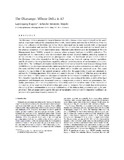| dc.description.abstract | The Okavango Delta is amongst the largest Ramsar sites (http://www.ramsar.org/sitelist.pdf) in the world and an important wetland for community livelihoods, conservation and tourism in Botswana. Over the years, the utilization of the delta has shifted from communal use to state control, with an increased use for conservation and tourism. This increased use for conservation and tourism has manifested in the physical expansion of the conservation area – Moremi Game Reserve and the formation of Wildlife Management Areas (WMAs) around the reserve, whose primary land use is wildlife utilization. The expansion of the conservation area has translated into several practical matters, including expansion of the area for non-hunting activities or photographic areas. The livelihoods of local communities of the Okavango delta who depended on fishing, hunter-gathering, livestock rearing, rain-fed agriculture and flood recession farming have been negatively affected by the expansion of conservation and tourism in the delta. The livelihoods alternatives in the form of Community Based Natural Resource Management (CBNRM) and tourism have not provided substitutes for the people as the communities are still reliant on the same old livelihood sources as in the past, albeit within smaller and restricted areas. This paper explores the ownership of the natural resources within the Okavango Delta. It asks and attempts to answer the following questions: Who owns and controls the use of the land? Who has access to other resources there in? Who makes the decisions on how the delta resources should be managed and used? Who benefits from the delta resources? We argue firstly that ownership of the delta as defined by legal parameters and demonstrated in natural resource management practice is vested on government. Secondly, government, after assuming ownership of the delta continues to sell its stake to the international community, at the expense of local ownership and access to resources. We conclude that in the process the ability of local communities to source a livelihood out of the delta as they previously used to, is compromised. This we argue works against the goal of sustainable development for improved livelihoods as proclaimed in government policy documents. | en_US |

